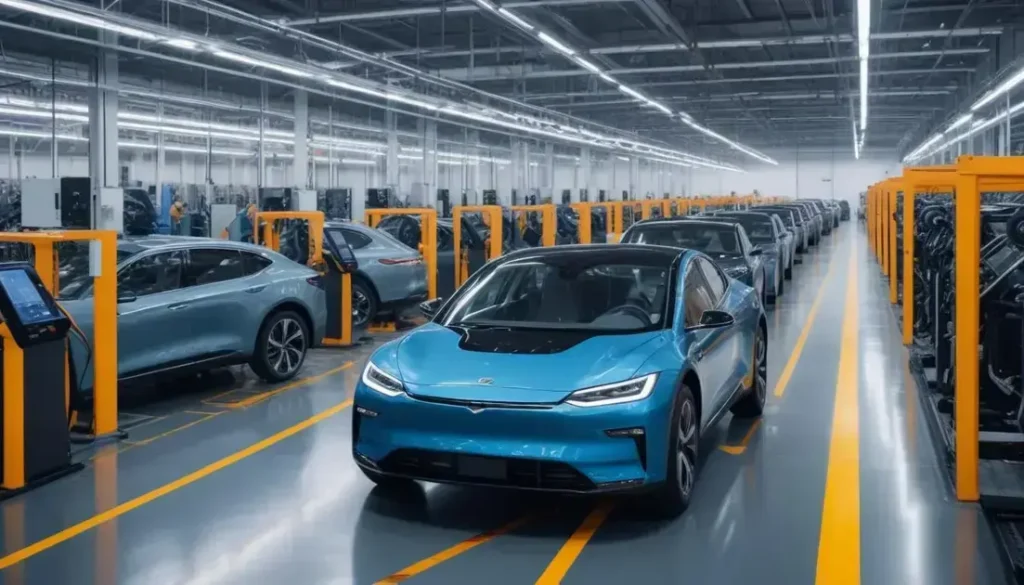JLR is focusing on electric vehicles and sustainability by enhancing ethical sourcing, implementing advanced technologies in supply chain management, and investing in workforce training to ensure resilience and innovation in the automotive industry.
Electric vehicles are reshaping industries across the globe, and JLR is at the forefront of this transformation. This article delves into how JLR’s new supply chain strategy will affect UK manufacturers and their pursuit of sustainability.
Introduction to JLR’s new supply chain strategy
JLR has embarked on a significant shift in its supply chain strategy, spearheading the transition towards more sustainable practices. This move is crucial in aligning with global trends that prioritise environmental responsibility. By integrating electric vehicles into their production lines, JLR aims to reduce carbon emissions and enhance efficiency.
One of the core elements of this strategy is the commitment to ethical sourcing of materials. JLR is focusing on ensuring that every component is traceable and sustainably sourced. This not only improves supply chain transparency but also reinforces the brand’s dedication to sustainability.
Incorporating advanced technologies into the supply chain is another vital aspect. JLR is investing in AI and data analytics to optimise logistics and inventory management, which will streamline operations and cut costs. Such innovations will enable them to respond swiftly to market changes and consumer demands.
Moreover, JLR’s new strategy places significant emphasis on training and development for its workforce. This approach ensures that employees are well-equipped with the necessary skills to adapt to new technologies and processes, fostering a culture of continuous improvement and innovation.
Role of electric vehicles in the automotive industry
The role of electric vehicles (EVs) in the automotive industry has become increasingly pivotal as manufacturers respond to growing environmental concerns. Traditional internal combustion engines face severe scrutiny, leading to a paradigm shift towards sustainable alternatives. EVs are not only eco-friendly but also promise significant cost savings in the long run.
Market trends indicate a clear transition, with major automotive firms investing heavily in EV technology. This has resulted in a surge of new models entering the market, designed to meet varying consumer needs. Manufacturers are also collaborating with technology companies to enhance the driving experience through connectivity and smart features.
Additionally, the rise of EVs has catalysed advancements in battery technology, making electric vehicles more efficient and accessible. Innovations such as faster charging solutions and longer battery life are crucial in attracting a broader customer base. As the industry evolves, the focus also shifts to sustainable practices, such as recycling battery components.
Furthermore, governments worldwide are implementing policies and incentives to promote EV adoption. This includes tax breaks, grants for purchasing EVs, and investments in charging infrastructure. Such measures create a favourable environment for consumers and manufacturers alike, setting the stage for a future dominated by electric mobility.
Impacts of global supply chain challenges
The global supply chain challenges have become a central issue for many industries, particularly the automotive sector. Factors such as the COVID-19 pandemic, geopolitical tensions, and climate change have significantly disrupted traditional supply networks. These challenges have prompted manufacturers to rethink their strategies and adapt to a rapidly changing environment.
One of the most noticeable impacts has been the increased costs associated with sourcing materials and transporting goods. From soaring freight fees to shortages of key components, manufacturers are facing unprecedented pressures that are driving up prices. This, in turn, affects the final cost of vehicles, leading to potential decreases in consumer demand.
Moreover, manufacturers are increasingly recognising the importance of building resilient supply chains. This involves diversifying suppliers and investing in local production to mitigate risks associated with global dependence. By doing so, companies aim to ensure a steadier flow of materials and components, helping to maintain production schedules.
Additionally, the focus on sustainability is guiding manufacturers to incorporate eco-friendly practices within their supply chains. This includes sourcing materials responsibly and reducing carbon footprints, aligning with consumer expectations for greener products. Ultimately, addressing these global supply chain challenges is essential for the long-term success and competitiveness of the automotive industry.
JLR’s focus on ethical sourcing and transparency
JLR’s commitment to ethical sourcing and transparency is a cornerstone of its new supply chain strategy. This initiative emphasises the importance of responsibly obtained materials, which not only benefits the environment but also reflects the company’s values. By prioritising sustainability in their supply chain, JLR aims to foster trust among consumers and stakeholders.
Transparency in sourcing is essential for informed consumer choices. JLR is implementing initiatives to ensure that every component is traceable back to its origin. This commitment allows customers to understand the ethical implications of their purchases, enhancing brand loyalty and reputation.
Moreover, JLR is collaborating with suppliers who share its vision for responsible practices. These partnerships involve rigorous assessments to ensure adherence to ethical standards. By working closely with suppliers, JLR can better monitor compliance with regulations and promote sustainable practices throughout the supply chain.
The drive for ethical sourcing also aligns with JLR’s strategy to reduce its carbon footprint. By sourcing materials locally whenever possible, the company aims to lessen its reliance on long-distance transportation, thus minimising emissions. This holistic approach not only supports sustainability but also reinforces JLR’s position as a leader in the automotive industry.
Appointment of specialists for material traceability
The appointment of specialists for material traceability is a significant step for JLR in ensuring a transparent and ethical supply chain. These experts play a crucial role in verifying the origins of materials used in vehicle production, reinforcing the company’s commitment to sustainability.
Specialists utilise advanced technologies such as blockchain and data analytics to establish a clear chain of custody for materials. This meticulous approach not only enhances transparency but also helps JLR to identify any potential risks within the supply chain. By knowing where materials come from, JLR can better assess their environmental and social impacts.
Additionally, these experts are tasked with conducting thorough audits of suppliers. This includes evaluating compliance with ethical sourcing standards and sustainability practices. Regular audits ensure that suppliers maintain the necessary standards throughout their operations, which is essential for fostering trust and integrity in the supply chain.
Furthermore, the presence of traceability specialists supports JLR’s transparency initiatives. By providing detailed reports on material sources, they enable the company to communicate its sustainability efforts effectively to consumers and stakeholders. This level of accountability not only enhances brand reputation but also aligns JLR with the evolving expectations of environmentally conscious consumers.
Technological advancements in supply chain management
Technological advancements in supply chain management are transforming how companies operate, particularly within the automotive sector. These innovations streamline processes, enhance efficiency, and provide real-time data analytics crucial for informed decision-making.
One of the most impactful developments is the integration of artificial intelligence and machine learning. These technologies enable companies to predict demand more accurately, optimise inventory levels, and reduce waste. By analysing vast amounts of data, firms can identify patterns and trends, facilitating a proactive approach to supply chain challenges.
Moreover, advancements in blockchain technology are improving transparency and traceability within the supply chain. This decentralised ledger system allows all parties to access verified and tamper-proof records of transactions, making it easier to track the movement of materials and components from their origin to the final product.
Additionally, the use of IoT (Internet of Things) devices has revolutionised supply chain monitoring. Sensors can track the condition and location of products throughout the supply chain, ensuring quality and security. This level of connectivity enables quicker responses to any issues that may arise during transportation or storage.
The adoption of these technological advancements not only enhances operational efficiency but also aligns with the growing demand for sustainability in the automotive industry, fostering a more responsible and agile supply chain.
Training initiatives for workforce development
Training initiatives for workforce development are becoming increasingly vital in the automotive industry, especially as companies like JLR transition to new technologies and sustainable practices. These initiatives aim to equip employees with the skills necessary to thrive in a rapidly evolving job market.
One significant aspect of these training programs is the focus on upskilling staff in areas such as electric vehicle technology, data analytics, and supply chain management. By providing comprehensive training, JLR ensures that its workforce is well-prepared to meet future demands and challenges.
Additionally, the inclusion of soft skills training is essential. Enhancing communication, teamwork, and problem-solving abilities enables employees to collaborate effectively, fostering a culture of innovation and adaptability. This holistic approach to workforce development aligns with JLR’s commitment to excellence in production and customer satisfaction.
Moreover, JLR is investing in partnerships with educational institutions to create tailored programmes that are responsive to industry needs. These collaborations not only enhance the learning experience but also contribute to a stronger talent pipeline for the company. As a result, JLR is building a skilled and resilient workforce capable of navigating the challenges of the modern automotive landscape.
Long-term planning and resilience in supply chains
Long-term planning and resilience in supply chains are critical components for success in the automotive industry, especially as companies face ongoing challenges from global disruptions. JLR is committed to adopting strategies that not only address immediate issues but also prepare for future uncertainties.
One key approach to enhancing resilience is the development of diversified supplier networks. By sourcing materials from various suppliers across different regions, JLR can minimise risks associated with reliance on a single source. This strategy allows the company to maintain production levels even when particular suppliers encounter difficulties.
Additionally, JLR invests in analytics and forecasting tools that enable better visibility into potential risks within the supply chain. By predicting disruptions, the company can implement contingency plans that mitigate impacts. These tools help ensure a more flexible and responsive supply chain that can adapt to changes in the market.
Moreover, fostering strong relationships with suppliers is essential for building resilience. JLR actively collaborates with its suppliers to create mutual value and align objectives. This collaborative approach ensures that all parties are better prepared to face challenges together, contributing to a more robust supply chain.
Ultimately, by focusing on long-term planning and resilience, JLR not only secures its operations but also enhances its competitive edge in the automotive market.
Conclusion: Future of JLR and UK manufacturing
The future of JLR and UK manufacturing hinges on a commitment to innovation and sustainability. As the automotive industry continues to evolve, JLR aims to position itself as a leader in electric vehicle production. This shift requires not only investment in advanced technologies but also a rethinking of traditional manufacturing processes.
JLR is embracing sustainable practices throughout its supply chain. By prioritising ethical sourcing and minimising environmental impact, the company is aligned with global trends towards greener production. This focus on sustainability resonates with consumers who are increasingly conscious of their environmental footprint.
Additionally, collaboration with technology partners will play a crucial role. By leveraging advancements in areas such as artificial intelligence and data analytics, JLR can enhance its operational efficiency and respond swiftly to market demands. This agility will be vital as the automotive landscape shifts towards more automated and connected vehicles.
The continuing development of the workforce is another essential aspect of securing the future. JLR’s investments in training and skill development will ensure that employees are equipped to meet the challenges of modern manufacturing. A skilled workforce is vital for driving innovation and maintaining competitive advantage in the market.
Looking Ahead: The Future of JLR and UK Manufacturing
In conclusion, the future of JLR and UK manufacturing is focused on innovation and sustainability. By embracing electric vehicle technology and implementing eco-friendly practices, JLR is setting a standard for the automotive industry.
With investments in advanced technology and a commitment to their workforce, JLR can adapt to changing market demands. This adaptability will be crucial in maintaining a competitive edge as the industry evolves.
Furthermore, the collaboration between JLR, suppliers, and educational institutions ensures a skilled workforce that can keep pace with advancements in manufacturing. As the automotive landscape continues to change, JLR’s proactive approach will likely lead to success.
The dedication to ethical sourcing and transparency also positions JLR as a brand that values responsibility. This alignment with consumer expectations will help build strong relationships and foster trust.
Ultimately, JLR’s focus on innovation, sustainability, and workforce development will shape a bright future for both the company and UK manufacturing as a whole.
Frequently Asked Questions
What is JLR’s focus in the automotive industry?
JLR focuses on innovation and sustainability, especially in electric vehicle production and eco-friendly manufacturing practices.
How is JLR ensuring transparency in its supply chain?
JLR is implementing ethical sourcing practices and appointing specialists for material traceability to enhance transparency.
What technologies is JLR adopting for supply chain management?
JLR is using advanced technologies like artificial intelligence, data analytics, and blockchain to optimise and secure its supply chain.
Why is workforce training important for JLR?
Training initiatives for workforce development are vital for equipping employees with necessary skills to adapt to new technologies and practices.
How does JLR build resilience in its supply chains?
JLR builds resilience by diversifying its supplier networks, using predictive analytics, and fostering strong relationships with suppliers.
What is the future outlook for JLR and UK manufacturing?
The future looks promising as JLR prioritises innovation, sustainability, and workforce development, positioning itself as a leader in the automotive industry.


